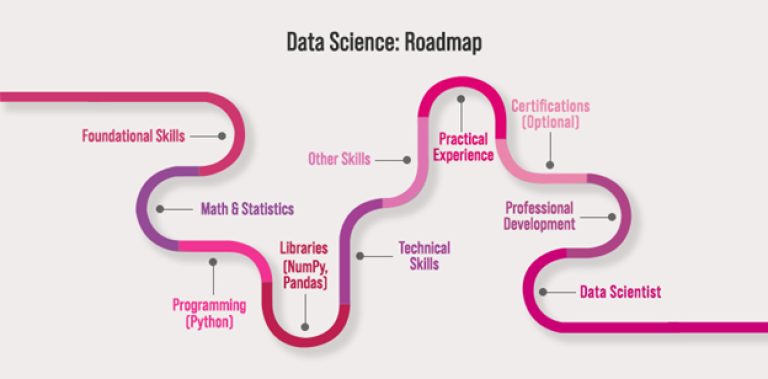Blog, Learning Guide
In today’s data-rich environment, businesses recognize the need to be data-driven; however, effectively acting on that data begins with…
by WeCloudData
June 25, 2025
Blog
Data science is a rapidly evolving and growing field with undiscovered potential. Do you find the world of data fascinating and want to know how to work as a data scientist in 2025? Whether starting your career in this domain or transitioning from another field, you need a data science roadmap to follow. WeCloudData is at your service to assist in achieving your dream job as a data scientist.
This blog covers everything from essential skills to the best resources, preparing you to succeed in the data scientist job market. Let’s get started.
Before discovering a data science roadmap, it’s important to understand what exactly data science means. So, data science is all about working around with data. It combines the application of statistics, mathematics, programming, and domain expertise. The end goal of data science is to extract meaningful information from data. Data science is now almost in every sector ranging from healthcare to finance and entertainment, helping companies make data-driven decisions. To learn more about data science follow this link
To start your data science career a strong foundation on three core areas is needed. You must have good technical skills, soft skills, and domain knowledge. Here’s a breakdown of the essential skills:
Along with technical skills, soft skills are also very important. Here is the major soft skill that a data scientist must possess.
Data scientists need to have business skills and domain expertise, here is why.
It can be intimidating to start a data science journey. This is an organized strategy/roadmap that you can follow:
Start learning the basics of Python or R. Platforms like Coursera, WeClouData, YouTube, and data science-related GitHub repositories offer excellent tutorials.
The next step is to learn how to manipulate data because raw data has no value. You need to manipulate data to use it. Learn data manipulation using Pandas with WeCloudData. Data visualization is also very important to learn data visualization using Python libraries Matplotlib and Seaborn and tools like Tableau, PowerBI.
Understanding the mathematical and statistical concepts is important for data analysis. Many resources like Coursera, GitHub, and YouTube can help. Weclouddata offers a Data Science bootcamp where all the key skills are taught with proper mentorship.
Learn concepts of supervised and unsupervised learning algorithms, how they work and how you can use them. Weclouddta offers beginner-friendly courses on machine learning to get you started. If you want to learn more about ML follow this link.
Get yourself familiar with deep learning, natural language processing, computer vision, and data science cloud tools. Learn about Computer Vision , Natural Language Processing and cloud platforms (Google Cloud, AWS, Azure) with WeCloudData. We offer fully guided practical hands-on courses to get the best of your effort and time.
The next step is to understand data engineering and big data tools as at some point of your career you have to work with big data. Learn about ETL (extract, transfer and load ) process and data engineering with WeCloudData. The courses are designed to facilitate both the beginners and the intermediate students.
The final stage is to showcase your skills with real-world projects. Use data science resources free from Kaggle and GitHub, and apply all the skills you learn while going through different data learning stages and apply those in your project.

The data scientist job market continues to thrive, with opportunities across various sectors. The demand for professionals with technical skills required for data scientist roles is on the rise.
Join WeCloudData and gain hands-on experience in Data Science with industry experts. Our data science bootcamp prepares you for real-world challenges, ensuring career success.
Explore our programs here!
"*" indicates required fields

WeCloudData is the leading data science and AI academy. Our blended learning courses have helped thousands of learners and many enterprises make successful leaps in their data journeys.
"*" indicates required fields
Canada:
180 Bloor St W #1003
Toronto, ON, Canada M5S 2V6
US:
16192 Coastal Hwy
Lewes, DE 19958, USA